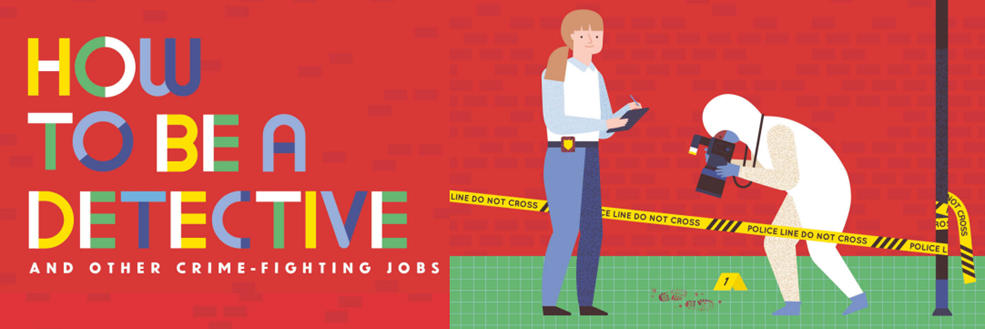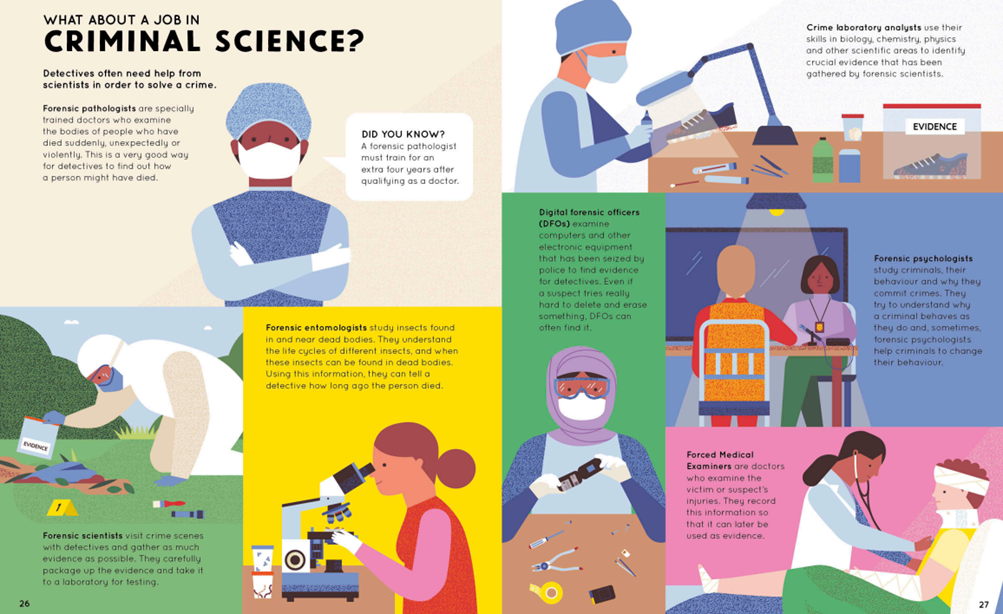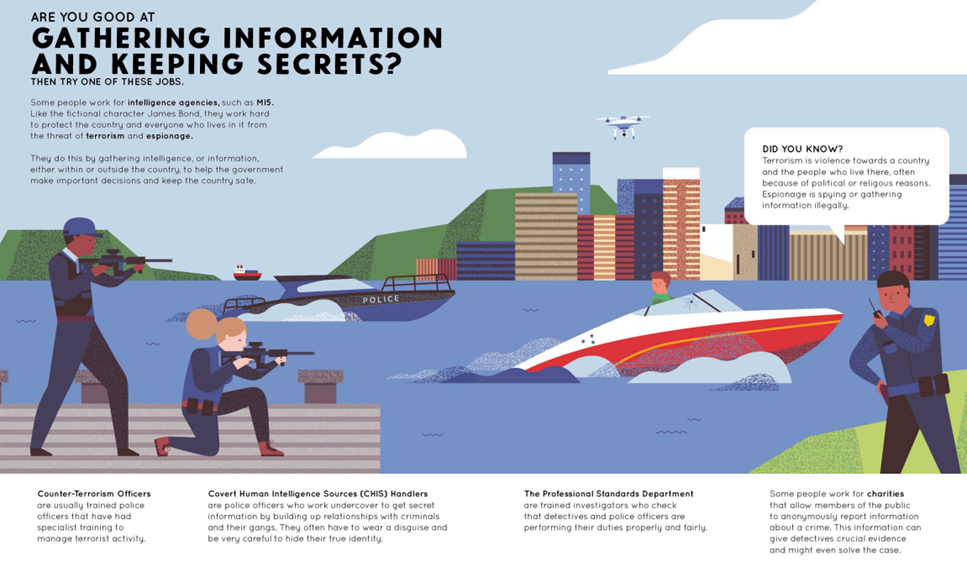Alexandra Beever


About Author
DC Alexandra Beever has been a detective with Thames Valley Police for 15 years. Following a science degree at university, she competed at the Olympics and won a gold medal at the World Championships as part of the GB Rowing Team. Alex enjoys spending time with her daughter, their miniature dachshunds and pony George. She also loves taking trips to the seaside and catching up with friends.
Sol Linero is a children's book illustrator and graphic designer from Buenos Aires. Her illustrations are filled with details and beautiful colours. she has worked for Pottery Barn Kids, Unicef and magazines such as Oprah, Jamie Oliver, Wired and The Washington Post.
Interview
How to be a Detective and Other Crime-Fighting Jobs (Nosy Crow)
May 2023
The 'How to be a...' series for children and young people introduces readers aged 8-12 years into a range of careers, from the initial book, How to be an Astronaut and other Space Jobs, to How to be a Footballer, How to be a Vet and How to be a Doctor. Detective Constable Alexandra Beever is behind the latest book in this series, How to be a Detective and Other Crime-Fighting Jobs, and here she tells us more about it.
Read an extract from How to be a Detective and Other Crime-Fighting Jobs.

Q&A with Alexandra Beever
1. Can you tell us a little about yourself and your job as a detective constable?
Before being in the police, I was part of the British Rowing Team. I then retired from rowing wanting to find a job that kept me on my toes and where each day would be different. I remember being very interested in the media reports of a murder case, which probably initiated my interest in a career as a detective!
I have been a police officer for 15 years, 12 of them as a detective. I really enjoyed the years I had as a uniformed officer, which gave me a good understanding of the basis of a criminal investigation. As a uniformed officer you investigate what is called 'volume crime' - i.e. shoplifting, low level assaults, and neighbour disputes - but you also are part of much more complex investigations. You can often end up being the first person on the scene of a murder and perhaps even arresting the suspect.
A detective investigates more complex crimes and the investigations are lengthier - some can take over four years to get to court. Not all investigations lead to a trial as sometimes there is just not the evidence that supports the offence reported. This can be frustrating, from a personal perspective, but the motivation for the job comes from achieving justice for those involved as victims and witnesses.
2. How did you become involved in writing a guide for children, How to be a Detective and Other Crime-Fighting Jobs?
It was a chance opportunity that came along at the right time! I felt settled in my career and in a position to offer my knowledge, but it also gave me a personal goal.
3. What did you want the book to cover? How is it organised?
I wanted the book to explain the role of a detective, and a little about the justice process. I also wanted to show just how many different roles there are in the police and how joining up as a uniformed officer can lead to such an exciting and varied career.
The book loosely follows a format set in the initial book of the series - How to be an Astronaut and other Space Jobs and the subsequent titles How to be a Footballer, How to be a Vet and How to be a Doctor.

4. Who is it aimed at? Why did you want this guide to be available to children?
The careers advice I received during my time at school was limited and uninspiring. I hope that by giving children information, role models and ideas at a young age - and by helping them find something that strikes an interest - it will help to focus the relevance of education and the importance of having a focus to learning during their school years.
After talking to friends and colleagues, it seems many of us passed through school without much thought for a career. If we can plant tiny seeds of interest, I hope that children are inspired and find a passion that they can develop into adulthood!
5. Is it hard to describe the job of a detective? Do you feel this role is often misunderstood?
The main confusion I see is that people think that as detectives we have access to all the technology that is seen on TV dramas. In reality, some results can take three to four months (in the case of toxicology samples) and years (for example breaking into a PIN coded phone) to achieve.
There is a misconception that a detective 'sides' with the victim when in reality their duty is to conduct a thorough investigation, collecting evidence and following all reasonable lines of enquiry, whether they point towards or away from any suspect.
6. Although you are a detective, were there still areas you needed to research in order to write your book?
Definitely - as you become more specialised in one role, other departments all have their own specialisms, so my knowledge in their areas isn't as strong. For example, a rapidly expanding area requiring expert knowledge is that of how criminals commit crime using technology - the internet and other digital media. Economic Crime investigations also require knowledge of banking and financial systems and then other departments have to be more skilled in dealing with child victims. It's a big reason for writing the book, as there really is a role for everyone's skill set!

7. Where else can children and young people go to find out more? Would reading detective novels help?
Anything that encourages a child to learn and sparks a passion - if detective novels inspire an inquisitive mind and get children asking questions rather than just accepting what is in front of them, then I think that's a great thing.
8. How else can they develop their detecting skills, if this is something they are keen to do in the future?
As mentioned in the book - going on 'treasure' hunts, looking for animal/shoe prints, following tracks, developing 'theories' (hypothesis) of how things ended up there. Yesterday, on a dog walk, my daughter found a lost glove - so we made up a story of how the glove got to be hanging on the branch of a tree!
9. What did you think of the illustrations by Sol Linero? What do they add to the book?
Sol did a fantastic job of interpreting the text. I love the bold colours and the detail she included in each spread. I think the spread about terrorism and espionage is quite exciting and very James Bond. I also like the spread on 'Criminal Science' as it details other exciting ways you can be involved in police work.

10. Do you visit schools to talk about your job?
I would definitely love to look at ways to support schools with delivering careers advice to primary school children.
 How to be a Detective and Other Crime-Fighting Jobs
How to be a Detective and Other Crime-Fighting Jobs
